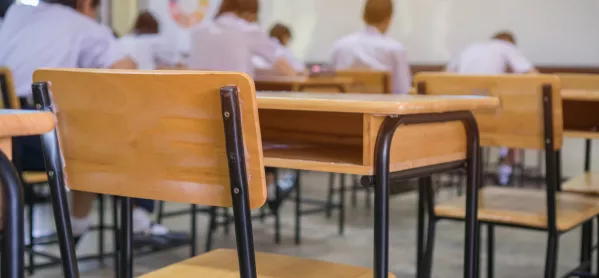Pupil absence a ‘stubborn concern’, Ofsted warns

Low pupil attendance in schools because of the coronavirus pandemic remains a “stubborn concern” this term, Ofsted has warned.
A series of reports from the watchdog suggests that pupils have been absent from class for a variety of reasons - including Covid-related anxiety among families, worse mental health and low resilience to setbacks or illness.
Children have also missed school owing to parents rescheduling or rearranging term-time holidays, as well as testing positive for Covid-19, inspectors found.
Covid impact: Ofsted’s main findings
Persistent absence: Schools to get ‘advisers’
Covid: School absences nearly double in a week
Pupil absence: Rises by nearly 30,000 in a fortnight
Some schools reported that they have seen more coronavirus-related absences among specific year groups - such as Year 11 and sixth-form students, who are due to take exams, and Year 8 - as well as disadvantaged pupils and those with special educational needs and disabilities (SEND).
The Ofsted reports look into the impact of the pandemic on children and learners. They are based on 214 routine inspections of nurseries, childminders, schools and further education and skills providers in England this term.
Inspectors found that primary schools were more likely to say that some pupils are not as resilient as they were previously, while secondary schools reported increased numbers of pupils suffering from anxiety and self-harming.
Continuing learning in classrooms
Ofsted chief inspector Amanda Spielman said: “Children have missed out so much already. And some pupils remain persistently absent from school for a variety of reasons.
“So, as we face further turbulence, we must do all we can to make sure children are able to continue learning in their classrooms.”
Ms Spielman is part of a new attendance alliance led by education secretary Nadhim Zahawi in an attempt to improve school attendance.
And Ofsted is working on a report that will highlight best practice in schools, which is set to be published next year.
The latest government figures suggest that 2.9 per cent of all pupils - nearly 236,000 children - were not in class for reasons connected to coronavirus on 9 December.
This was up from 208,000 children, or 2.6 per cent of all pupils, on 25 November.
School leaders said that lockdowns have particularly affected the newest cohorts in schools, who are arriving with lower starting points than previous years.
Some secondary schools have extended the school day to help pupils catch up, while other heads said they are offering sessions after school, before school or on Saturdays for those who need extra support.
Government must do ‘everything possible’
Geoff Barton, general secretary of the Association of School and College Leaders, said: “Obviously, the ongoing issue is high levels of absence among pupils and students as the virus continues to cause huge disruption.
“This is why it is so important that the government does everything possible to support the mitigations and controls necessary to keep children in the classroom.
“In particular, it must provide more support for testing and ventilation, and it must ensure there is sufficient capacity to roll out second doses of the vaccination programme for 12- to 15-year-olds at the speed and scale that is required.”
He added: “The Omicron variant of Covid-19 clearly poses an increased risk of more educational disruption.
“It is therefore imperative that the government communicates any additional control measures to the sector promptly and with clarity. Its record on both fronts has not been good in the past.”
Paul Whiteman, general secretary of the NAHT school leaders’ union, said: “The great news here, as Ofsted points out, is that schools are doing an excellent job helping children recover from the lost learning and development they suffered during the pandemic.
“But schools are still suffering from huge disruption, with soaring levels of Covid-related absence for both pupils and staff.
“This needs to be recognised, and more needs to be done to help bring the situation under control and to stem the spread of the virus in classrooms - especially in the face of the new variant.”
You need a Tes subscription to read this article
Subscribe now to read this article and get other subscriber-only content:
- Unlimited access to all Tes magazine content
- Exclusive subscriber-only stories
- Award-winning email newsletters
Already a subscriber? Log in
You need a subscription to read this article
Subscribe now to read this article and get other subscriber-only content, including:
- Unlimited access to all Tes magazine content
- Exclusive subscriber-only stories
- Award-winning email newsletters
topics in this article



